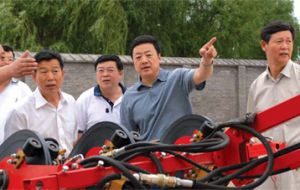MercoPress. South Atlantic News Agency
China’s largest agro enterprise plans to buy or lease 200.000 hectares world wide
 Among the countries included by Sui Fengfu (second from right) are Argentina, Brazil and Venezuela
Among the countries included by Sui Fengfu (second from right) are Argentina, Brazil and Venezuela China’s largest agricultural enterprise, Heilongjiang Beidahuang Nongken Group, will acquire or lease 200,000 hectares of cropland in countries including Brazil, Argentina, Venezuela, Russia, The Philippines, Australia and Zimbabwe, the official People’s Daily newspaper said.
Heilongjiang’s chairman, Sui Fengfu, told the paper that the acquisitions will be carried out throughout the remainder of 2011.
The state-run company invested more than 38 million USD between 2005 and 2010 in a global expansion for which the particulars varied by country, he said.
“In Venezuela and Zimbabwe, the group mainly provides machinery and labourers, and takes about 20% of the harvest in return,” Sui said. “In Australia, it is mainly through the acquisition of local farmland. In Brazil and Argentina, the business model involves renting land”.
China, the world’s most populous country with 1.34 billion citizens, is experiencing an agricultural deficit that has spurred the authorities to seek access to crops outside its territory.
In fact, according to somewhat dated statistics, less than 11% of Chinese territory is arable, though the country has ample technology, labour and capital.
“Countries in South America, for example, have arable land and need our technology and investment, and they welcome our companies. It’s a win-win solution” said Wang Yunkun, deputy director of the Agriculture and Rural Affairs Committee of the National People’s Congress.




Top Comments
Disclaimer & comment rules-

-

Read all commentsI understand China's need to feed its masses, but I question the good sense of Brasilian landowners selling off bits of Brasil to China.
Mar 15th, 2011 - 04:55 pm 0Brasil has lots of land and water; things grow here. And a land-ownership can cover thousands of square miles.
I know Brasilian landowners have a right to sell their land because this is a nation of free enterprise, but there are higher issues at stake.
A land-sale is a once-off transaction; ever after the purchaser derives benefit (in this case, transfer of food to China).
Retaining the land and selling each year the productivity to China creates potential for an ever-lasting reciprocality in trade and national income.
As it says in the song . . . “I'm against it”.
It is just a matter of time before China starts dealing in world-wide real estate for population-transfer.
As eastern China withers under climate change, whole regions of China will need to be re-located. It is illogical to assume that this will be done just within the 'national boundary'.
When they come for our land and build on it *their cities, for their people*, will it still be Brasil?
...destiny !
Mar 15th, 2011 - 07:26 pm 0Commenting for this story is now closed.
If you have a Facebook account, become a fan and comment on our Facebook Page!